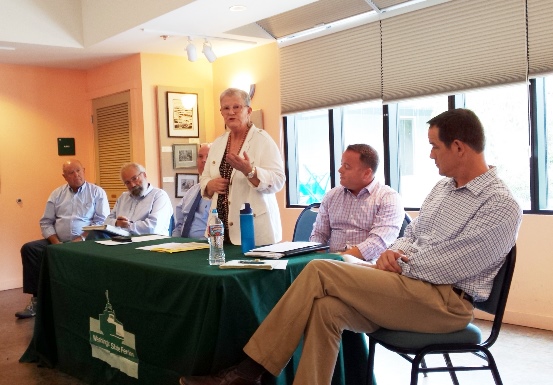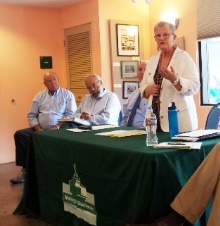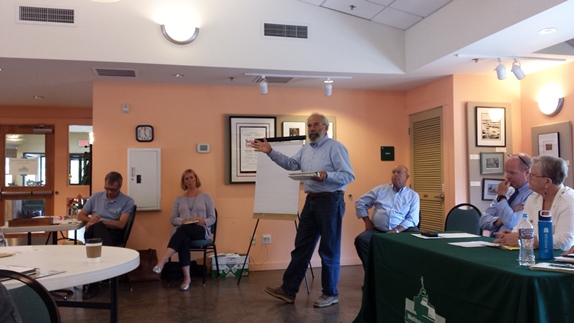— by Margie Doyle —

Secretary for Ferries Lynn Griffith meets Orcas residents, with, from left, Bob Jarman, Jim Corenman, Rick Hughes (partially hidden), Brian Churchwell and Jay Mooney, Port Captain
In a county-style marathon last week, top officials of the Washington State Ferry (WSF) system visited the four ferry-served islands over three days to hear from the communities.
On Aug. 9, Washington State Ferries Assistant Secretary Lynne Griffith met with a roomful of ferry-riders at the Orcas Senior Center where she explained recent decisions and heard a variety of complaints, from the size of the tables on the passenger decks to earthquake preparedness and everything in between.
Griffith was accompanied by WSF staff in communications, government liaison, reservations management and port operations. Also at the Orcas meeting were State Senator Kevin Ranker, County Councilmen Rick Hughes and Bob Jarman, and San Juan Islands Ferry Advisory Committee (FAC) Chair Jim Corenfeld.Lopez Island resident Debbie Young, who serves on the state Transportation Commission, was also in attendance as were Larry Vandermay and John Whetten.
Lynn Griffith described the goals achieved since she came on board in 2015 ?as Secretary of the Ferries for the State Transportation Department (DOT). ” I came on board right afters the design and beginning workings of the [Anacortes-San Juans] reservations system., I remember the hiccups, the technology challenges…“some of that has been smoothed out — in exchange for new problems that I think we’ll hear about tonight,” she said.
The challenges addressed so far have been:
1) to address the Ferries Management team and recruiting new leadership, which is “all in place except for the finance director. We are now recruiting for that position.”
2) to unite ferry organization: “career vs administration; terminals vs deck; labor vs. management has impeded WSF’s ability to get its act together.”
3) to focus on capital investments, with four new ferries in construction. “They are desperately needed for an aging ferry system — all but seven ferries are over 30 years old.”
4) how to communicate with the state legislature in terms of funding the fleet and dealing with the expectations of the system — there are challenges in terms of our operating budget. We have to find some balance– it’s not a big ask, but engaging the legislature in our challenges and what our options might be” present the difficulties, said Griffith.
The Reservation System
Ridership on the Anacortes – San Juans route is up to a record high, “not seen since 1999… and you’re feeling the impact here in the community. We implemented the reservation system because we had received legislative direction to manage demand on this system; to try to take advantage of all trips…. and they system has worked; it has spread the demand across [the schedule], there are no long lines in Anacortes,”
At the same time Griffith said that the “30-minute rule” instituted this spring, where reservation holders must present at the toll booth at least 30 minutes before the scheduled ferry sailing for which they have a reservation, “has been problematic for us too.
“People on the islands did get engaged and weighed in on this,” she said. “[However], we didn’t keep you informed of our decision-making; that has upset a lot of people That was our mistake and all I can do is apologize.” Griffith added that she has made some changes in personnel as a result of that mistake. “We talked to captains and terminal people; we got on board and tried to find a happy balance between what is operationally needed for us and what people on the islands want; and also our loaders and captainss in terms of safety.
“And in general we’re good with it. We understand some aren’t, and we ask, let’s give it time. Peak season is not the right time to make policy decisions. The reason we’re doing it [the 30-minute cutoff rule] is for safe loading. The loaders need to ballast the boat and make sure it is filled in a way to provide for safe sailing.” Multi-destination sailings and trying to accommodate standbys add to the technicalities of the problem.
Griffith said, “It’s not perfect, but something we think is working. We need to hear from you how it’s not working.”
Concessions and Food Service Vendors
Griffith also described the controversy over turning over food services at the Anacortes terminal and on several ferry routes to Centerplate, a national food service corporation. She defended WSF’s decision saying, “We’re required by law to go out for competitive service every ten years [through] an RFP process responding to criteria and deadlines to evaluate and compare proposals.
“Some folks were disappointed in the results, who didn’t fare as well in the evaluation and decision-making process.” She faulted Cheesecake Cafe at the Anacortes terminal for choosing not to protest within the three-day window after the decision was announced, “and at that point, that’s it.”
She said that the case of ferry-route vendor Olympic Cascade Food Service which did protest the decision, “There is still one more step that could occur in the next couple of weeks to go before judges. The selected party will be awarded the contract and move forward.”
When Margie Aipopo, owner of the Cheesecake Cafe, spoke up to disagree, Griffith said, “There are liabilities for us if we don’t follow the process. It was fair; now it’s in the court’s hand.”
Reservations
The Orcas group also heard from Brian Churchwell, in charge of the ferry reservation system. He said that ridership of was up 4.4 percent, with 4, 000 people traveling with reservations over the 4th of July weekend this year, “People are showing up in vessel-size chunks.” He added that ferry terminal workers “say things have gone better than last summer — less questions, less stress.”
Churchwell brought up the issues presented by “no-shows,” those who make reservations and don’t show up. He said the rate of no-shows per sailing was 12 percent overall, and that up to 25% of reservation holders don’t show up, typically for the later sailings. “[The reservation systems shows that] sailings are full, but we have available space,” he said.
Churchwell said that they had addressed website issues by hiring a third-party firm in website development in mid-July and implementing 50 percent of their recommended changes.
The Community
Rick Hughes, as County Council liaison to the FAC said that the county “holds ferries to a high level of expectations; we often haven’t agreed with ferry administration and I try to pass on complaints. But we need to pay attention to the fact that 95% of the time, they’re on time, and we can rely on them.
“We have yet to recover from not building boats for 16 years,” Hughes said. He also thanked Senator Ranker for his help in keeping the Klahowya as a backup for interisland sailings
Jim Corenfeld next addressed the group, saying that the FAC is to go-between in “the community’s needs and desires and WSF’s constraints.” He asked for public feedback through emails to fac@sanjuanco.com
Questions brought up by audience members, which the officials agreed to respond to were listed as:
1) Resident program for reservations
2) Observance of the 30-minute rule when the schedule sailing is late;
3) Abuse of reservations;
4) Evening service from Friday Harbor to Orcas year round;
5) Reservation toll booth express booth with paid (commuter) tickets;
6) Transferring from Lopez to Orcas, on evening schedule where now two boats travel from Anacortes but neither stop at Orcas Island;
7) no expiry date for commuter discounted tickets.
**If you are reading theOrcasonian for free, thank your fellow islanders. If you would like to support theOrcasonian CLICK HERE to set your modestly-priced, voluntary subscription. Otherwise, no worries; we’re happy to share with you.**









I love the new reservation system and have actually been able to enjoy a nice dinner or buy groceries in Anacortes without having to worry that I should get in the lineup FOUR hours before the ferry leaves.
Yes, do replace the old ferries. Perhaps the Washington legislature is waiting for a capsize/catastrophe before the lights come on in their little empty skullbuckets?
The issue of ADA compliance MUST be addressed. Disabled individuals are more likely to be late, primarily due to their individual disabilities, and are thus subjected to an arbitrary rule that they can never comply with. I am confined to a walker (cane on a good day) and my wife is blind, yet we are shunted to the standby lane at both Orcas and Anacortes – on occasion we have been boarded in a position where we cannot reach either the elevator or the main deck restroom (few of which are ADA compliant)
Griffith stated “The reason we’re doing it [the 30-minute cutoff rule] is for safe loading. The loaders need to ballast the boat and make sure it is filled in a way to provide for safe sailing.”
If one shows up 25 minutes before departure time they will get shunted to the standby line. After the reservation vehicles are loaded they will start loading standbys. How does taking one vehicle instead of another, and I’m talking normal vehicles, not large trucks, affect the ballast of the boat? It doesn’t. That answer is just political gobbledygook. Give an answer which seems on the surface to have a logical rational, but in actuality is totally meaningless.
Come on Griffith, please give us a rational, and truthful, justification for the 30 minute rule.